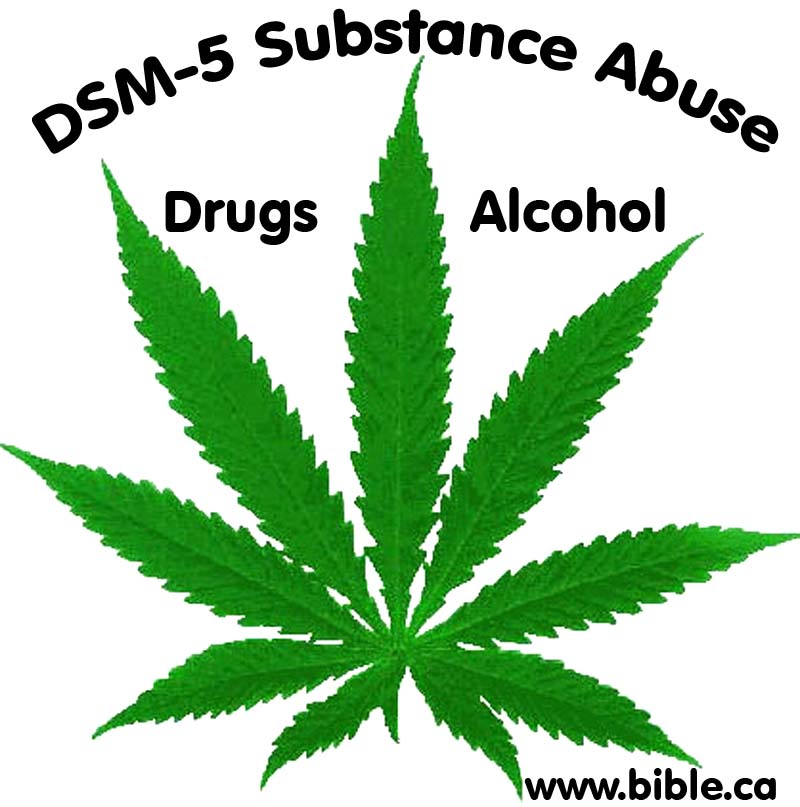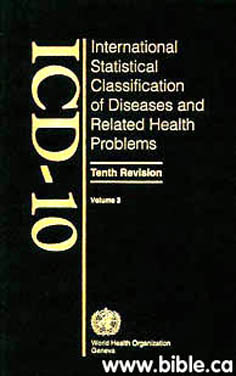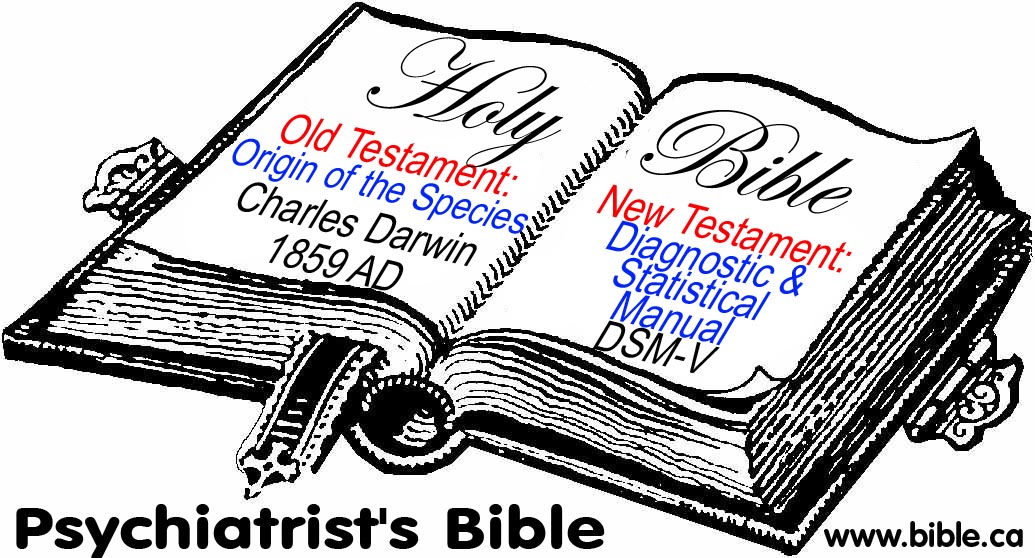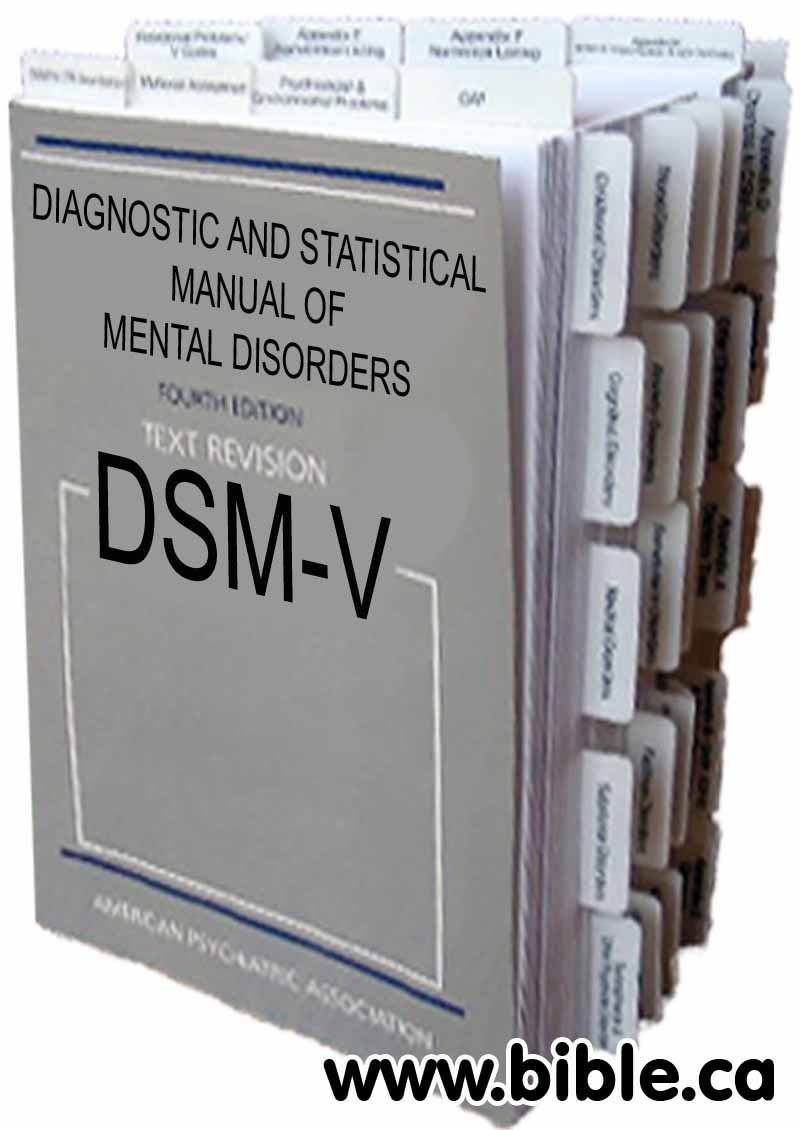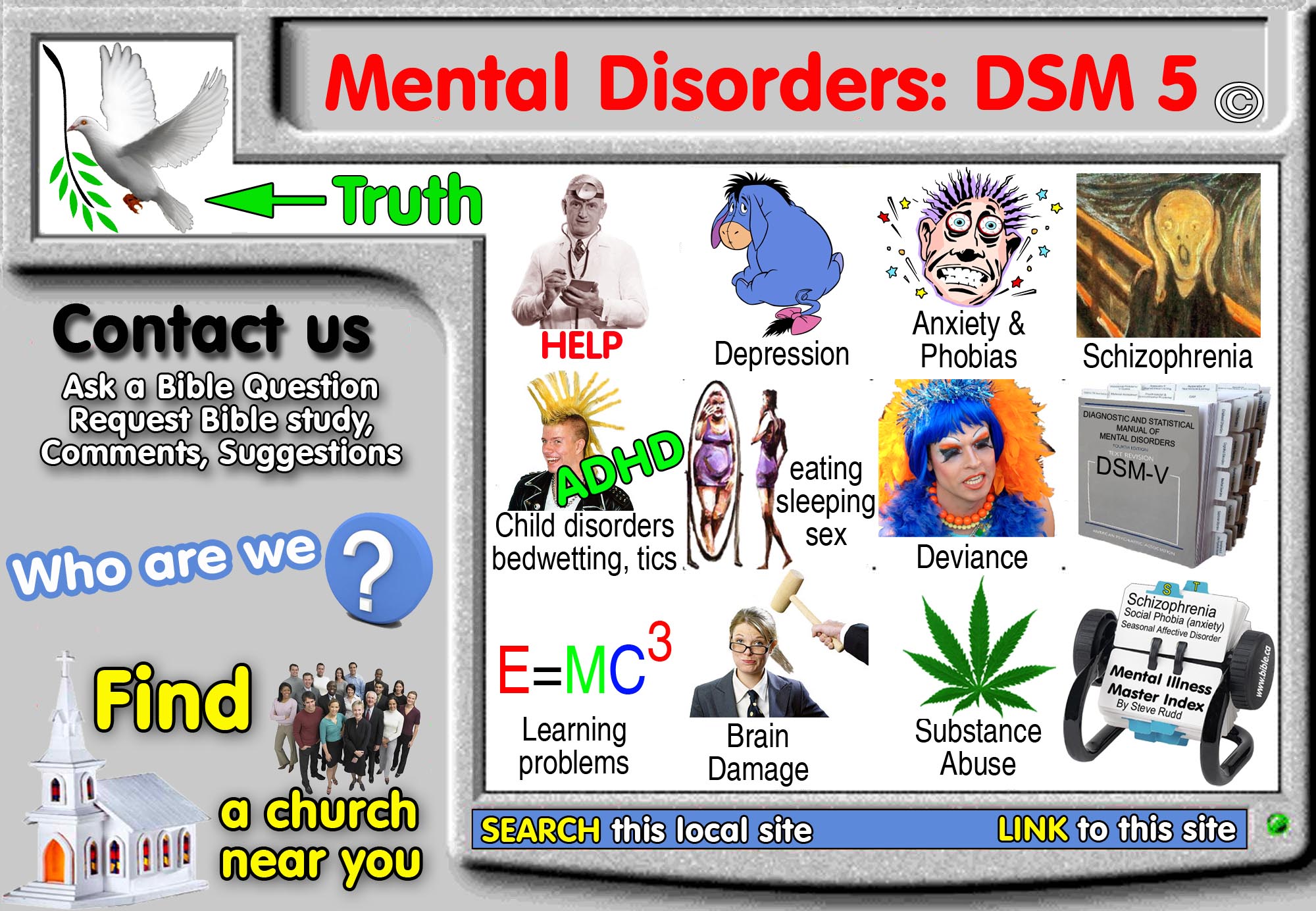DSM-IV, DSM-5, ICD-10: Substance Abuse: Alcohol and drugs
"Although alcohol and Drug abuse can causes brain damage and impair cognition, it does not cause schizophrenia. However, once a person becomes substance abuse free, they may choose the behaviours of depression, anxiety, schizophrenia or suicide when they comprehend the full negative impact their self-inflicted brain damage will have on them for the rest of their life."
|
|
|||
|
|
Substance Abuse: Alcohol and drugs F10-F19 Mental and behavioral disorders due to psychoactive substance use Drug and alcohol abuse can damage the body impairing cognition, but has no direct effect upon the spirit with is the seat of mood and choice. |
||
|
|
|||
|
DSM-IV, DSM-5, ICD-10 International Classifications of Diseases Diagnostic and Statistical Manual |
|||
Introduction:
1. While drug and alcohol abuse can cause both physical and cognitive damage, it never causes schizophrenia or any mental illness. Schizophrenia is a behaviour choice that has its origin in the human spirit. Drugs and alcohol damage the body and do not force mood or choice.
a. Cases: Egg, Dominatrix
b. Twelve step programs like AA don't work. The only way you quit substance abuse is when you choose to stop. See also: Alcoholics Anonymous (AA)
2. It is important to remember that the physical damage Drug and alcohol abuse does to the human body can change cognitive abilities and memory (amnesia), but not basic personality.
- Drug abuse does not cause
schizophrenia: The DSM-5 fails to take into account the human
spirit as an etiology of a differential diagnosis. The mind comprehends
the impairment caused through substance abuse and the impact such
"handicap" will have on the future of their life. The understanding
that they have "screwed up their own life permanently" may lead
to anxiety or depression. This anxiety or depression is not caused by the
physical illness, but rather the mind understanding how the
self-inflicted brain damage will change their life for the worse, which
in turn makes them sad (depressed) and upset (anxious). This is precisely
what happened in the case of "Egg"
who committed suicide after he "fried his brain on heroin".
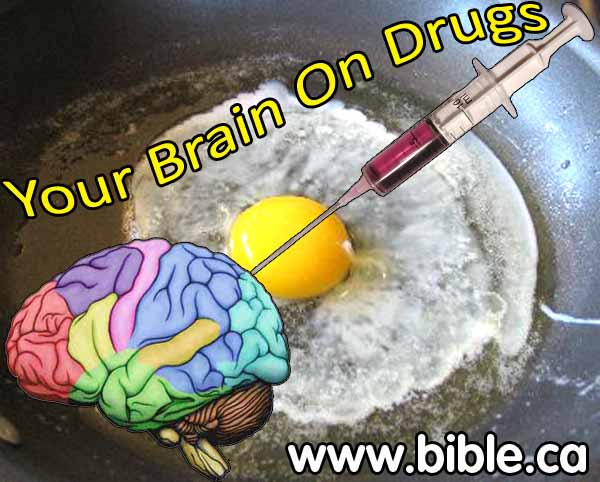
- A drunken or stoned mother while fetus inside her womb can induce fetal alcohol syndrome which can impair cognitive abilities.
- Drugs are dangerous: Many a young man has "fried his brain on heroin" and suffered permanent cognitive impairment long after he is drug free: Cases: Egg
- It is important to remember that although chemicals like drugs and alcohol can cause brain damage, they never directly cause mood changes or force choices.
3. Brain injury from a car accident can trigger a chronic amnesia where the person never remembers anything about their spouse after 40 years. However, it is important to note that basic personality remains intact even in cases of complete amnesia. "Mental disorder" can simply mean an impaired cognitive ability apart from depression, anxiety, paranoia and schizophrenia. For example, getting hit on the head can cause a severe change in mental abilities but it doesn't change personality.
4. "There are, of course, people who are mentally ill. If I were to raise a crowbar and bring it down squarely across your head, you would have-literally-mental illness; there would be no question about it. You would have an illness caused by physical, organic brain damage. Quite legitimately you could be declared "ill." In every genuine sense of the term you would be mentally ill. Some people whose brains have been injured by toxic substances have mental illness." (The Big Umbrella, Lecture, Jay Adams)
5. "Consider the cases of alcohol-induced persisting dementia and alcohol abuse. Dementia occurs when so much alcohol is consumed that brain damage results. A diagnosis can be made only if memory is impaired and another cognitive deficit such as agnosia or aphasia is present. In contrast, alcohol abuse requires only a pattern of use that causes moderate symptoms of impairment or distress. These disorders differ in terms of severity, etiology, course, prevalence, prognosis, and social relativity, but the DSM classifies them both as valid mental disorders. A single definition of disorder must account for a person whose massive alcohol consumption has damaged his or her short term memory and ability to identify common objects as well as a person who repeatedly has arguments with a roommate when drunk. Thus, the DSM concept of disorder encompasses behaviors that are severe, biologically based, chronic, uncommon, incurable, and universal as well as behaviors that are mild, psychologically based, remitting, common, curable, and culturally relative." (The Journal of mind and behavior, Guy A. Boysen, v28, p 157-173)
6. "The DSM-IV-TR criteria for substance-induced presentations suggest that psychiatric symptomatology be attributed to the substance use if the symptoms remit within 4 weeks of the cessation of acute intoxication, withdrawal, or medication use. During the DSM-IV deliberations, the choice of a 4-week limit was somewhat controversial, and this guideline must be applied with clinical judgment. Some clinicians, particularly those who work in substance use treatment settings, were most concerned about the possibility of misdiagnosing a substance-induced presentation as a primary mental disorder. Thus, they suggested allowing a 6- or 8- week period of abstinence before considering the diagnosis to be a primary mental disorder." (DSM-IV-TR Guidebook, 2004 AD, p 88)
7. "Ruling Out Substance Etiology: The first question that should always be considered in differential diagnosis is whether the presenting symptoms arise from an exogenous psychoactive sub-stance that is exerting a direct effect on the central nervous system. This is particularly important both because substance use is an increasingly common (and of-ten overlooked) cause of psychopathology and because identifying this etiology has obvious and immediate treatment implication. ... Virtually any presentation encountered in a mental health setting can be caused by substance use. DSM-IV-TR describes 10 Substance-Induced Disorders based on the predominant presenting symptoms. These are Substance Intoxication, Substance Withdrawal, Substance-Induced Delirium, Substance-Induced Persisting Dementia, Substance-Induced Persisting Amnestic Disorder, Substance-Induced Psychotic Disorder, Substance-Induced Mood Disorder, Substance-Induced Anxiety Disorder, Substance-Induced Sexual Dysfunction, and Substance-Induced Sleep Disorder." (DSM-IV-TR Guidebook, 2004 AD, p 86)
8. Although alcohol and Drug abuse can causes brain damage and impair cognition, it does not cause schizophrenia. However, once a person becomes substance abuse free, they may choose the behaviours of depression, anxiety, schizophrenia or suicide when they comprehend the full negative impact their self-inflicted brain damage will have on them for the rest of their life.
9. Drug and alcohol abuse can damage the body impairing cognition, but has no direct effect upon the spirit with is the seat of mood and choice.
|
DSM-IV, DSM-5, ICD-10: Substance Abuse: Alcohol and drugs |
F01-F09 Mental disorders due to known physiological conditions (DSM-5 and ICD-10)
F10 Mental and behavioral disorders due to use of alcohol
F10.0 Acute intoxication
F10.1 Harmful use
F10.2 Dependence syndrome
F10.3 Withdrawal state
F10.4 Withdrawal state with delirium
F10.5 Psychotic disorder
F10.6 Amnesic syndrome
F10.7 Residual and late-onset psychotic disorder
F10.8 Other mental and behavioral disorders
F10.9 Unspecified mental and behavioral disorder
F11 Mental and behavioral disorders due to use of opioids
F11.0 Acute intoxication
F11.1 Harmful use
F11.2 Dependence syndrome
F11.3 Withdrawal state
F11.4 Withdrawal state with delirium
F11.5 Psychotic disorder
F11.6 Amnesic syndrome
F11.7 Residual and late-onset psychotic disorder
F11.8 Other mental and behavioral disorders
F11.9 Unspecified mental and behavioral disorder
F12 Mental and behavioral disorders due to use of cannabinoids
F12.0 Acute intoxication
F12.1 Harmful use
F12.2 Dependence syndrome
F12.3 Withdrawal state
F12.4 Withdrawal state with delirium
F12.5 Psychotic disorder
F12.6 Amnesic syndrome
F12.7 Residual and late-onset psychotic disorder
F12.8 Other mental and behavioral disorders
F12.9 Unspecified mental and behavioral disorder
F13 Mental and behavioral disorders due to use of sedatives or hypnotics
F13.0 Acute intoxication
F13.1 Harmful use
F13.2 Dependence syndrome
F13.3 Withdrawal state
F13.4 Withdrawal state with delirium
F13.5 Psychotic disorder
F13.6 Amnesic syndrome
F13.7 Residual and late-onset psychotic disorder
F13.8 Other mental and behavioral disorders
F13.9 Unspecified mental and behavioral disorder
F14 Mental and behavioral disorders due to use of cocaine
F14.0 Acute intoxication
F14.1 Harmful use
F14.2 Dependence syndrome
F14.3 Withdrawal state
F14.4 Withdrawal state with delirium
F14.5 Psychotic disorder
F14.6 Amnesic syndrome
F14.7 Residual and late-onset psychotic disorder
F14.8 Other mental and behavioral disorders
F14.9 Unspecified mental and behavioral disorder
F15 Mental and behavioral disorders due to use of other stimulants, including caffeine
F15.0 Acute intoxication
F15.1 Harmful use
F15.2 Dependence syndrome
F15.3 Withdrawal state
F15.4 Withdrawal state with delirium
F15.5 Psychotic disorder
F15.6 Amnesic syndrome
F15.7 Residual and late-onset psychotic disorder
F15.8 Other mental and behavioral disorders
F15.9 Unspecified mental and behavioral disorder
F16 Mental and behavioral disorders due to use of hallucinogens
F16.0 Acute intoxication
F16.1 Harmful use
F16.2 Dependence syndrome
F16.3 Withdrawal state
F16.4 Withdrawal state with delirium
F16.5 Psychotic disorder
F16.6 Amnesic syndrome
F16.7 Residual and late-onset psychotic disorder
F16.8 Other mental and behavioral disorders
F16.9 Unspecified mental and behavioral disorder
F17 Mental and behavioral disorders due to use of tobacco
F17.0 Acute intoxication
F17.1 Harmful use
F17.2 Dependence syndrome
F17.3 Withdrawal state
F17.4 Withdrawal state with delirium
F17.5 Psychotic disorder
F17.6 Amnesic syndrome
F17.7 Residual and late-onset psychotic disorder
F17.8 Other mental and behavioral disorders
F17.9 Unspecified mental and behavioral disorder
F18 Mental and behavioral disorders due to use of volatile solvents
F18.0 Acute intoxication
F18.1 Harmful use
F18.2 Dependence syndrome
F18.3 Withdrawal state
F18.4 Withdrawal state with delirium
F18.5 Psychotic disorder
F18.6 Amnesic syndrome
F18.7 Residual and late-onset psychotic disorder
F18.8 Other mental and behavioral disorders
F18.9 Unspecified mental and behavioral disorder
F19 Mental and behavioral disorders due to multiple-drug use and use of other psychoactive substances
F19.0 Acute intoxication
F19.1 Harmful use
F19.2 Dependence syndrome
F19.3 Withdrawal state
F19.4 Withdrawal state with delirium
F19.5 Psychotic disorder
F19.6 Amnesic syndrome
F19.7 Residual and late-onset psychotic disorder
F19.8 Other mental and behavioral disorders
F19.9 Unspecified mental and behavioral disorder
By Steve Rudd: Contact the author for comments, input or corrections.
Send us your story about your experience with modern Psychiatry
